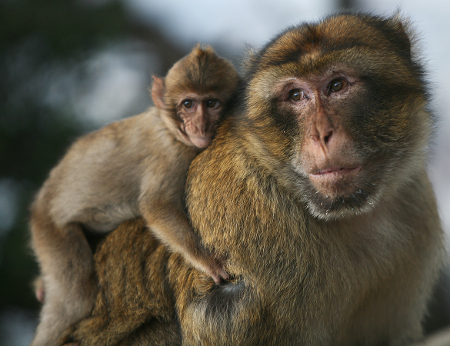Using AI to control energy for indoor agriculture
30 September 2024
Published online 29 December 2014
Male Barbary macaques socialize with other males as a stress-coping mechanism, study reveals.

Male Barbary macaques living in Morocco’s mountains form social bonds - akin to human friendships - to buffer stressors including fierce fighting over female partners and surviving bitter winter cold.
Scientists from the University of Lincoln, UK, Georg-August University and German Primate Center, and University of South Africa have found that developing associations with other dominant males led to reduced levels of glucocorticoid, the stress hormone.The study was published in Proceedings of the National Academy of Sciences1 .
“This is the first evidence that proves that male-male social bonds can lower stress by decreasing the levels of stress hormone glucocorticoid in non-human primates,” says Bonaventura Majolo, a co-author of the study.
Prolonged stress elevates the levels of glucocorticoid which, in turn, suppress innate immune systems, increasing the risks of disease and death in human and non-human primates2,3. Previous studies had shown that social bonds benefit mainly females and pair-bonded animals during periods of stress. But this is the first study that sheds light on the effects of male-male social bonds.
Majolo and his teammates looked at “socially-bonded” male wild Barbary macaques living in two separate groups. They measured the levels of a glucocorticoid-derived metabolite (fGCM) in their faeces, when they faced bouts of aggressions from males in the group or low temperature in winter.
The researchers concluded that the stronger the social bonds, the lower the levels of fGCM detected in macaques when they faced repeated aggressions from other males in the group. A male with strong social bonds had lower fGCM levels when he was exposed to extreme winter cold.
The insights gleaned from the effects of these social bonds could potentially be useful for devising stress-coping strategies in humans who are increasingly vulnerable to stress-induced disorders such as depression, says Majolo.
Sheldon Cohen, director at the Laboratory for the Study of Stress, Immunity and Disease of Carnegie Mellon University in the US says that it is generally thought that women are mainly responsible for emotional support between humans, causing a gap in human studies focusing on male-male social support. But this study adds to the knowledge of stress-coping mechanism of social support among males, he adds.
doi:10.1038/nmiddleeast.2014.286
Stay connected: